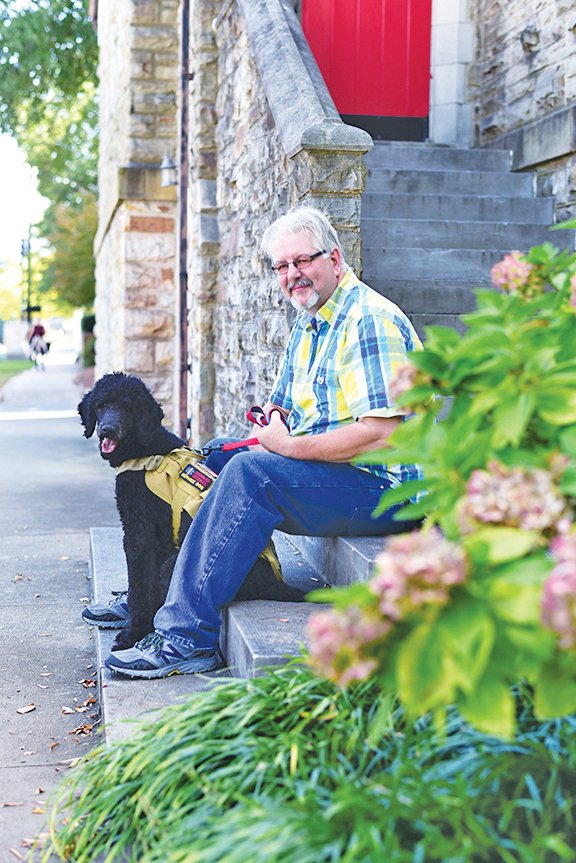When Russell Steed arrived in Hope to pick out a possible service dog, Jasper — a 4-month-old poodle — was the first to run into Steed’s arms.
“The minute I got out of the car, he came to me. I picked him up in my arms, and he was mine from then on,” Steed said.
Steed, a veteran of the U.S. Navy, has been diagnosed with post-traumatic stress disorder. He said he went looking for a service dog after becoming “hard to live with.”
“I had been doing research and learned that having service dogs made things easier,” said Steed, who lives in Benton. “The medications that I was taking, the side effects were just horrible, so I wanted something different.
“I did my research and found a dog, and figured out how to train him myself.”
Steed, who founded IGY6, or I Got Your Six, hosted an adoption event in August at the Saline County Fairgrounds in Benton. He said that while he didn’t have as many veterans as he would have liked in attendance, nine dogs from Bryant Animal Control and the Humanie Society of Saline County found forever homes because of the event. He was unsure if they went to veterans.
“I would call it a success,” Steed said.
He plans to host another event next year in conjunction with the Arkansas Freedom Fund.
“Most times, most companies that do this, they pick a dog for the person,” Steed said. “The way I feel about this, it is about the bond the person has with the dog.”
Steed said since he got his dog, things have gotten better.
“I am sleeping six hours a night. My nightmares have not gone away, but they have decreased,” Steed said. “They’ve gone from weekly to monthly.
“Same with night sweats and tossing and turning. Things are improving.”
Steed said Jasper helps him with everything.
“I have what they call micro seizures, and so far, they are only when I sleep,” he said. “[Jasper] buts me with his head whenever I am going to have one.
“He knows when they are going to happen. He knows when I am fixing to have a migraine.
“He does all sorts of things.”
Steed said Jasper also helps him get out of chairs, and “if I am in a stressful situation, he leads me out of the room.”
“There are all sorts of things that he does for me,” Steed said. “If I am getting emotionally overloaded, he gets me out of that. If I’m having panic attacks, he removes me from the situation.
“He has taught himself how to do most of those things. I didn’t do it.”
Steed said that when he began searching for a dog, he had to have a nonshedding dog because of his 17-year-old son Declan, who has Asperger syndrome and asthma.
“My wife, Tane, has asthma, too,” Steed said. “So I went looking for that kind of dog, and we found him on Pet Finder.
“We have been inseparable ever since.”
Steed served in the U.S. Navy from 1989 to 1992 before sustaining an injury aboard the USS Carl Vinson, an aircraft carrier.
Another veteran, Mikel Brooks of Ward and founder of the nonprofit We are the 22, has a service dog for his PTSD. He met Steed through the foundation.
“I have a shepherd-husky mix, and she is very good with stress,” Brooks said. “She is awesome.”
It is the second service dog for Brooks after his first dog died after being run over by a car.
“It took awhile to get over that loss, but I got [my new dog] in May,” Brooks said. “I trained her for a couple months. She has been in active service for 10 months.”
Brooks joined the Army National Guard when he was 17 in 1999 with his mother’s permission. He was in active duty until about 2009, when he was severely wounded.
“Combat veterans who are traumatized usually isolate and withdraw from society,” Brook said. “Having a service dog means having a constant companion.
“It is something that depends on you every day. It helps distract a veteran, allowing them to focus more on the dog and what it is doing than being stressed from being in a public scenario.
“They help keep the veteran calm.”
Both Brooks and Steed had their dogs certified by Dr. Bob Zepecki of Village Pet Services in Hot Springs.
“We bring him the veterans and their dogs, and he helps them get certified,” Brooks said.
According to Steed, the Veterans Affairs office does not recognize PTSD dogs.
“As it stands right now, the only dogs that the VA recognizes are [guide] dogs, hearing dogs and mobility dogs,” Steed said. “Please call your state representatives and ask them to support the Puppies Assisting Wounded Servicemembers, or P.A.W.S. Act.
“If that becomes a law, the VA will have to support PTSD service dogs.”
Steed said the main goal is getting dogs to veterans who need them.
“Dogs are amazing animals,” Steed said. “It is all-out the bond that they have with their handler or owner.
“There are a lot of things I didn’t teach him. He did it himself.”
Steed is currently enrolled in Animal Behavior College to be a dog trainer. For more information, visit the website at www.animalbehaviorcollege.com.
“Once that happens, I am going to open a school to train PTSD service dogs full time for veterans or anyone who needs a PTSD-trained dog,” he said. “This is my passion, so I am running with it.
“Training Jasper has been the greatest thing I have ever done.”
Staff writer Sam Pierce can be reached at (501) 244-4314 or spierce@arkansasonline.com.
